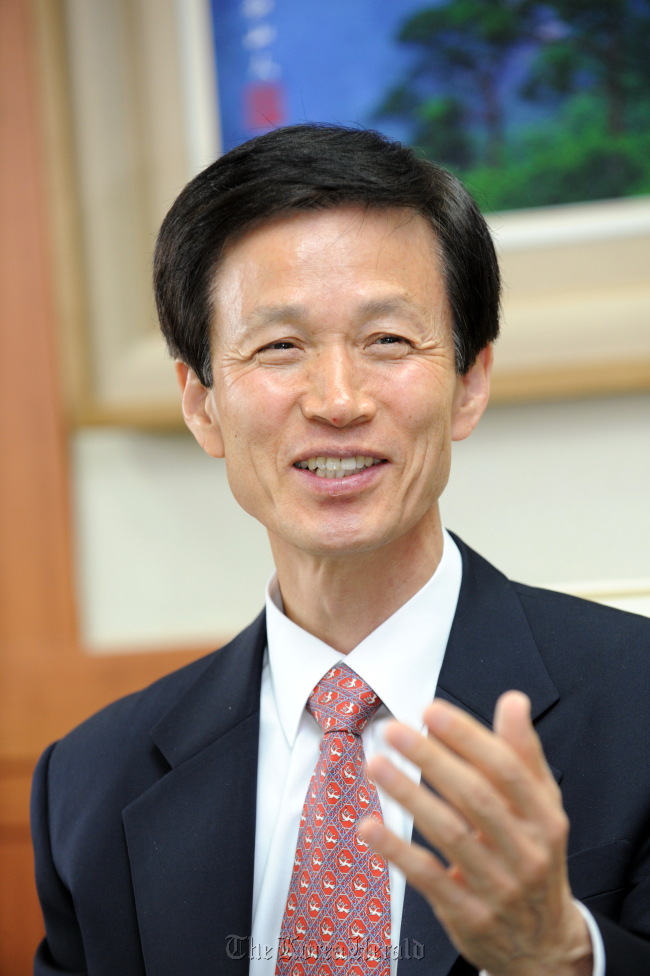Minister Lee says Korea’s successful forest rehabilitation will be shared through the global organization
The establishment of the Asian Forest Cooperation Organization, or AFoCO, was made in accordance with the agreement between the governments of Korea and the member states of Association of Southeast Asian Nations on forest cooperation.
Minister Lee Don-koo of the Korea Forest Service expressed that “the milestone of successful rehabilitation of Korea’s degraded land will be shared with the world through AFoCO.”
One year after Lee earned worldwide acclaim for the results of the 10th Conference of the Parties to the U.N. Convention to Combat Desertification, or UNCCD COP10, he is in the spotlight once again for his initiative to create an international organization to put the vision of “Low Carbon Green Growth” into practice.
Lee’s main strategy to achieve “Global Green Growth” centers on the establishment of AFoCO. It was eventually realized through the entry into force of the agreement between ASEAN member states and Korea, which was signed at the 14th ASEAN-Korea Summit on Nov. 18 in Bali, Indonesia.
The establishment of the Asian Forest Cooperation Organization, or AFoCO, was made in accordance with the agreement between the governments of Korea and the member states of Association of Southeast Asian Nations on forest cooperation.
Minister Lee Don-koo of the Korea Forest Service expressed that “the milestone of successful rehabilitation of Korea’s degraded land will be shared with the world through AFoCO.”
One year after Lee earned worldwide acclaim for the results of the 10th Conference of the Parties to the U.N. Convention to Combat Desertification, or UNCCD COP10, he is in the spotlight once again for his initiative to create an international organization to put the vision of “Low Carbon Green Growth” into practice.
Lee’s main strategy to achieve “Global Green Growth” centers on the establishment of AFoCO. It was eventually realized through the entry into force of the agreement between ASEAN member states and Korea, which was signed at the 14th ASEAN-Korea Summit on Nov. 18 in Bali, Indonesia.

AFoCO, which is the first international organization coping with diverse forest issues in Asia, is the epitome of Lee’s firm belief in cross-border cooperation in forestry.
An internationally-renowned forestry professor of Seoul National University, a regular member of the Royal Swedish Academy of Sciences and president of International Union of Forest Research Organization, or IUFRO, Lee told The Korea Herald that “AFoCO is an international organization that will share the successful achievement of afforestation in Korea and become a driving force of global green growth.”
Q: Could you explain the purpose and the schedule of the Special ASEAN-Korea Ministerial Meeting on Forestry, or SMMF, which will be held on Aug. 29-30 in Seoul?
A: The SMMF will commemorate the entry into force of the agreement and will celebrate the eventual establishment of the AFoCO Secretariat on Sept. 1. This will be the first time that the ministers responsible for forestry of the ASEAN member states and Korea will gather. It is expected to embrace diverse dialogues that would strengthen the forest cooperation between ASEAN member states and Korea since the meeting includes the Senior Officials Meeting on Forestry and the Special ASEAN- Korea Ministerial Meeting on Forestry.
Q: Then, the forestry cooperation with ASEAN member states is likely to be strengthened through the SMMF. What are your expectations from this meeting?
A: The agreement, which is a concrete outcome of Korea’s vision of “Low Carbon Green Growth,” was signed last year and came into effect on Aug. 5. In this context, the SMMF is expected to become a platform that facilitates the implementation of the agreement. We hope the importance of international and regional cooperation on forestry is emphasized with the practical cooperation projects that will be initiated in September 2012. There is a ministerial statement titled “Seoul Declaration on Forestry” that is planned to be adopted for long-term forestry cooperation between ASEAN member states and Korea.
Q: Is it true that AFoCO will be established in Korea in September for to reinforce forestry cooperation with ASEAN member states?
A: Yes, AFoCO will be the first international organization dealing with forest matters in Asia. This organization was first proposed by President Lee Myung-bak at the ASEAN-Korea Commemorative Summit held in June 2009. Subsequently, the agreement was signed at the 14th ASEAN-Korea Summit on Nov. 18, 2011 in Bali, Indonesia, and entered into force on Aug. 5, 2012.
AFoCO, a multilateral regional organization, will be a permanent and legally-independent entity based on a binding agreement among Asian countries. Once established in Seoul, the organization will seek to expand its members to Central Asian and Northeast Asian countries during the next two years.
Q: AFoCO is viewed as the first international organization dedicated to forestry in Asia. Please tell us about its goals.
A: The primary goals of AFoCO include: enhancing regional cooperation in the field of forestry so as to help the member countries build their capacity to cope with and adjust to climate change, desertification and other current and emerging environmental issues in the Asian region; promoting the conservation and utilization of forests and forestry in an environmentally friendly and economically sustainable manner in the Asian countries whose economies are highly dependent on forest resources; and pooling the expertise and technology that Korea has built in the field of forestry to jointly promote green growth in the Asian region. Asian countries including the ASEAN member states have expressed keen interest in Korea’s successful afforestation that paved the way for its rapid economic growth after the 1950-53 Korean War. Some forest-rich nations, like Indonesia, have expressed their intention to emulate Korea’s successful forest management.
Q: The KFS has continued to enhance its international relations by building bilateral partnerships with 16 countries. A new chapter will open in the upcoming Special ASEAN- Korea Ministerial Meeting on Forestry, when a new partnership with the Philippines will be launched. Could you elaborate on the purpose of the KFS partnership with the Philippines?
A: The KFS has been pushing forward a wide range of cross-border cooperation in forestry with partner countries including Chile and Brazil. Such efforts have led to a variety of cooperative projects aimed at securing wood resources, providing support for forest rehabilitation and preventing desertification and sandstorms in the partner countries.
The KFS plans to sign a new memorandum of understanding with the Department of Environment and Natural Resources of the Philippines and also hold a Forest Cooperative Committee Meeting with Vietnam, which will be its the seventh session, during the upcoming Special ASEAN-Korea Ministerial Meeting on Forestry. These countries have high potential for forest resources development in the future.
The KFS has set its sights not only on securing wood resources and the biodiversity of Korean forests, which is viewed as an important environmental asset for the future, but also on transferring its research and afforestation technology to other Asian countries for mutual environmental and economic benefits.
Q: International cooperation in forestry sector including securing overseas forest resources and coping with environmental issues is expected to become more and more important over the years. Please tell us about the plans on how to deal with this growing importance?
A: The KFS has started to expand its international relations with countries in South America as well as Africa. The KFS will strengthen bilateral cooperation with partner countries, reinforce policies on subsidies for the private sector, and provide consulting and relevant investment information to the private sector to encourage overseas forest investment. We will initiate strong “Green Leadership” on global environmental issues by supporting developing countries through mechanisms like the Changwon Initiative and AFoCO. We will share the lessons learnt and experiences of successful forest rehabilitation in Korea and also implement various programs in the areas of climate change and biodiversity conservation, combating desertification, human resources development, and transfer of related technology. The International Affairs Bureau was newly organized in January 2012. The KFS will lead successful international cooperation by developing strong organizational capacity with professional human resources and new initiatives.
By Lee Kwon-hyung (kwonh@heraldcorp.com)
-
Articles by Korea Herald





![[Herald Interview] 'Amid aging population, Korea to invite more young professionals from overseas'](http://res.heraldm.com/phpwas/restmb_idxmake.php?idx=644&simg=/content/image/2024/04/24/20240424050844_0.jpg&u=20240424200058)












![[KH Explains] Korean shipbuilding stocks rally: Real growth or bubble?](http://res.heraldm.com/phpwas/restmb_idxmake.php?idx=652&simg=/content/image/2024/04/25/20240425050656_0.jpg&u=)

